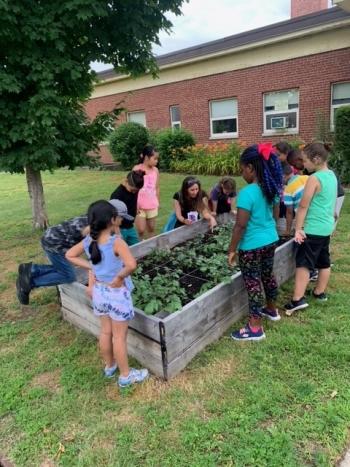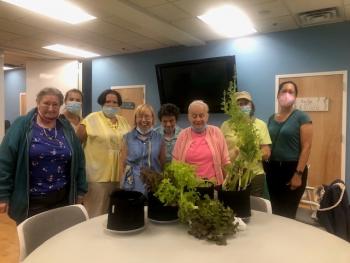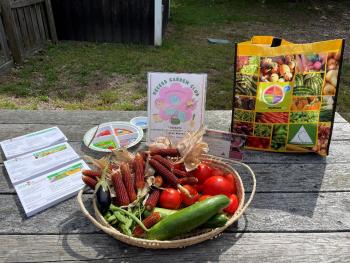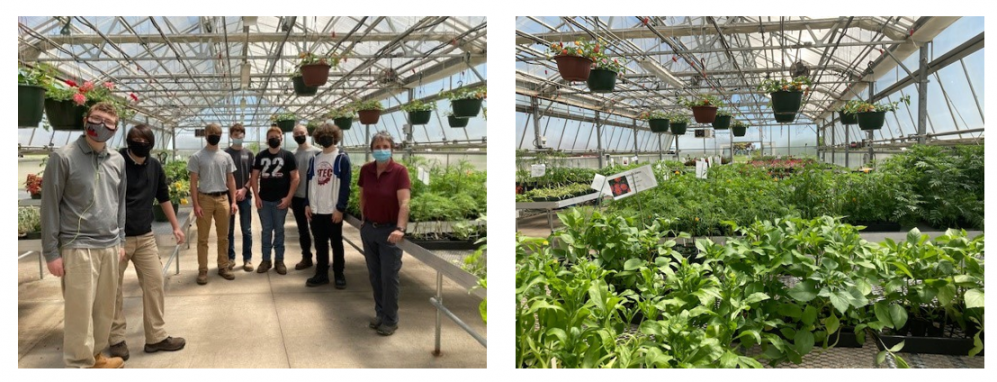In Our Spotlight
Massachusetts SNAP-Ed Provides Education and Local Foods for Participants
- Kathy Cunningham, M.Ed., RD, LD, Multi-level Specialist
Massachusetts SNAP-Ed families enjoyed growing, preparing, and eating fresh, local vegetables, fruits, and herbs in 2021, with the help of SNAP-Ed implementing agencies and their partners.
From the shores of Barnstable, Plymouth, and Boston to the foothills of Springfield and Holyoke, SNAP-Ed staff worked in 50 garden beds. They produced greater than 500 pounds of produce. Agencies also partnered with local farms to give access to kale, corn, swiss chard, tomatoes, eggplant, basil, carrots, zucchini, bell pepper, beans, lettuces, and herbs to over 2500 SNAP-eligible adults, children, and elders. Garden beds were located at public schools, libraries, food pantries, churches, elder housing sites, and on the Cape Cod fair grounds.
Let’s take a look at what the IA’s were up to in 2021
- Ascentria Care Alliance and UMass Extension partnered with 32 elementary schools in Springfield and Plymouth to teach a series of garden-based nutrition education lessons to more than 544 students.
- Several Bay Cove Seniors in Boston took part in a lettuce grow bag program in their homes, where participants were amazed at how easy it was to grow their own delicious lettuce!
- Share Our Strength /Cooking Matters provided educational information and links to the Healthy Incentives Program (HIP) to increase knowledge and enable 82 SNAP participants to access this benefit and purchased seedlings to start their own gardens.

Partnerships to support access
Ascentria partnered with West Springfield Career Technical Education Center Horticulture program, where students grew 500 vegetable seedlings which were distributed to five elementary schools. Ascentria partnered with a community food drive and handed out 581 home garden kits and 1,264 seed packets.
 New partnerships were started in 2021 with the Plymouth Housing Authority to install patio gardens and ‘pop-up’ farmers markets for seniors. Continued partnerships were sustained with the Plymouth Sheriff’s Department and Terra Cura who provided the greenhouse and seeds to start over 400 seedlings for planting in school and community gardens. The Plymouth Food Service department transformed the garden grown tomatoes, peppers, and herbs into the annual garden-to-cafeteria tomato sauce luncheon served in the public schools.
New partnerships were started in 2021 with the Plymouth Housing Authority to install patio gardens and ‘pop-up’ farmers markets for seniors. Continued partnerships were sustained with the Plymouth Sheriff’s Department and Terra Cura who provided the greenhouse and seeds to start over 400 seedlings for planting in school and community gardens. The Plymouth Food Service department transformed the garden grown tomatoes, peppers, and herbs into the annual garden-to-cafeteria tomato sauce luncheon served in the public schools.
Cape Cod Extension program partnered with local farms and community gardens to grow and distribute ethnically relevant crops. In conjunction with the Cultural Community Garden initiative, Cooperative Extension contributed to and distributed 750 multilingual Garden Community Cookbooks - Everyone Eats. The cookbook was designed to complement the crops being grown in the cultural gardens, and inspire creativity in the kitchen through Portuguese, Haitian, and Jamaican inspired recipes.
Implementing Agencies also worked with many food pantries to grow vegetables and give participants access to local farms’ produce donations. To support preparation of new or unfamiliar produce, participants were given healthy recipes and nutrition education tips.
Conclusion
When families garden together there is an increased chance family members will try a new vegetable. Gardening also provides families with opportunities for physical activity making this a win-win for everyone. Next year, MA Implementing agencies are looking to sustain and create more partnerships with local farms and create opportunities for SNAP-eligible families to participate in a variety of ways in their local systems and to utilize their Healthy Incentive HIP benefits.

